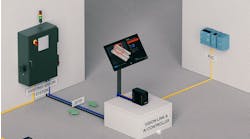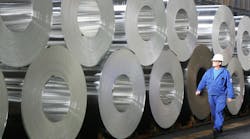Aluminum foil wraps burritos, physics equipment, and the highlighted tresses of hair-salon customers. It forms flexible ducts and lasagna pans, lines cigarette packs and fast-food sandwich wrappers. It hides between layers of film in flexible packaging. It protects aspirin bottles from tampering, petri dishes from light, and tractor engines from overheating. It tops yogurt cups and peanut cans. It backs blister packs of antihistamines, antacids, and birth-control pills. It goes into automotive parts and air-conditioning systems.
U.S. manufacturers rely on aluminum foil. So do nail salons, building contractors and bakeries.
To the Trump administration, however, none of these businesses—or their employees—matter as much as a couple of domestic aluminum makers.
Disregarding the ripple effects, the Commerce Department has said it will impose preliminary duties of 97% to 162% on the Chinese imports that supply much of the U.S. market with thin aluminum foil. That's likely to have much more far-reaching effects on U.S. companies than the minor deals President Donald Trump announced on his trip to China.
Aluminum-foil buyers, many of them swing-state manufacturers, are reeling at the size of the duties, which would at least double the price of Chinese foil.
"It's pretty much saying, 'Don't buy from China, you can't buy from them ever again,'" says Jim Kelley, vice president of Comet Metals Inc., in Solon, Ohio. The president may think he's getting tough on China, but his administration's policy is causing plenty of collateral damage at home.
Comet is what's known in the trade as an aluminum converter. It buys truckloads of foil in huge rolls and cuts it into smaller pieces for specialty uses. Converters serve two types of customers: those who need small quantities and those who can't wait for a large shipment. They're the middlemen between aluminum plants and the rest of the economy.
With Chinese suppliers effectively off-limits, they're now scrambling to find new sources and anticipating steep price increases. Only two companies have U.S. mills making the thin-gauge foil affected by the duties. The ones owned by Sweden-based Gränges are already selling all they can produce; the company has announced plans to expand capacity at its Tennessee mill by 2019. Converters say that JW Aluminum Co., the Mt. Holly, South Carolina-based company that lobbied strongly for the duties, isn't offering them much, if any, additional supply.
Instead of China, Comet's future foil will come from other foreign countries. "We're looking in Spain, Indonesia—we might have to look in Russia," says Kelley, sounding none too pleased about the latter prospect.
Russian aluminum plants are among the big winners from the closing of the China market. Unlike U.S. makers, they have the capacity to fill new orders even from small converters. They also have the quality buyers want. And, like U.S. mills, they stand to gain from the higher prices created by the artificial shortage.
Aluminum-foil buyers say that capacity and quality were what drove them to Chinese mills and other overseas producers. "At one point, the 25% of our total foil that was supplied domestically was the source of over 95% of our raw material rejection," writes Tom Scott of Harvard, Illinois-based Catty Corp., the country's oldest foil converter, in a blog post. That was in the 1990s, but the quality disparity remains. U.S. mills are old, with outdated equipment, while Chinese mills are state-of-the-art.
"There's a mill specifically that I deal with in the U.S. for the really light gauges that I regularly have rejects in the neighborhood of 15 to 20%," says Kevin C. Foos, president of All-Foils Inc., in Strongsville, Ohio.
Anticipating the duties, Foos has been looking for new suppliers. "Because North American mills can't meet the demand, I've had to qualify different mills from all over the world," he says, including some in Russia, Bulgaria, South Korea and Taiwan. Effectively banning Chinese imports from the U.S. market lets foreign mills jack up their prices, forcing converters to pass on increases to their own customers and, quite possibly, lose business. Converters in Mexico and Canada, for instance, could import Chinese aluminum foil without paying the sky-high duties and then export their products into the U.S. under the North American Free Trade Agreement.
Until the whammy of the new duties, All-Foils was enjoying solid growth. Sales are up 30% in the past year, Foos says, and the company added 10 employees, bringing its roster to 75. "It's a small business," he acknowledges, "but we make up 50% of America." It's not the half that gets attention in Washington.
Foos, who voted for Trump, is exactly the kind of heartland manufacturer who should be the president's base. Now he's frustrated. The supposedly pro-business administration isn't listening to growth-oriented entrepreneurs like him. Instead, it's siding with big companies that are substituting political influence for investment and value-creation.
"I think people hear, 'Make America Great,' and they think bringing jobs back to America. What jobs is this going to bring back?" says Foos. "It's going to improve the aluminum manufacturers' bottom line. It's not going to improve it because they got better, or they got more efficient, or they figured out a better way to do it. It's going to be because they've been able to raise their price and fill their mills, because people don't have choices anymore."
This column does not necessarily reflect the opinion of the editorial board or Bloomberg LP and its owners. Nor does it necessarily New Equipment Digest's opinions.










